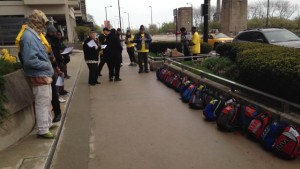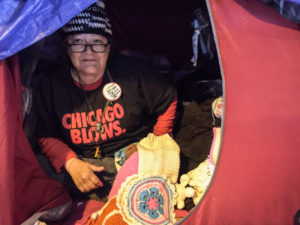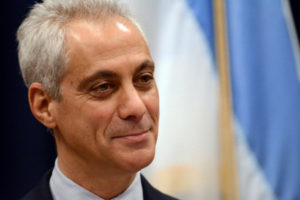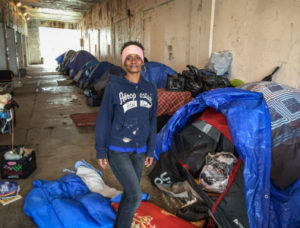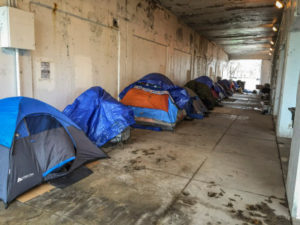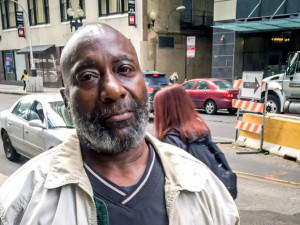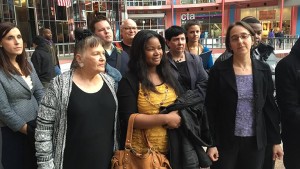By John Byrne, Tribune reporter
For Mayor Rahm Emanuel, tackling the tricky politics of Chicago’s homeless problem amounts to a no-win situation.
Tagged with the “Mayor 1 Percent” nickname by his harshest critics, the millionaire mayor tends not to get the benefit of the doubt on the issue, even when he came out in favor Monday of a new tax on Airbnb rentals to fund programs aimed at getting people off the streets and into permanent housing.
And when Emanuel rolled out a new trial program to help the “chronically homeless,” he made the focus moving people out of encampments under Lake Shore Drive viaducts on the North Side. The tent cities in and around Uptown have long been a particular source of tension, given the neighborhood’s history as an area with large populations of poor and working-class people and the fact it perennially seems on the verge of gentrification by those drawn to its nearby beaches and abundant public transportation.
That thicket of historical and class issues opened Emanuel up to criticism that he’s more worried about sanitizing the lakefront for warm-weather crowds than he is about seriously addressing the problem.
“Don’t pretend you’re doing anything about homelessness,” said Andy Thayer, of the Uptown Tent City Organizers. “You’re cleaning up the lakefront for yuppie tourists.”
Emanuel’s top social services aide said that’s not the case. Those residing under four viaducts were chosen for the next phase of the city’s homelessness efforts because the roughly 75 people living there make the size of the population appropriate for the program, and the diversity of the group in terms of age and the issues they face means they could qualify for a variety of housing programs, said Lisa Morrison Butler, commissioner of the Department of Family and Social Services.
She said there was no pressure from the city to get the homeless population out of the viaducts close to the concert venue at Montrose Beach and other lakefront attractions.
“I can honestly say the mayor never said to me: ‘Clean out the lakeshore encampments so people don’t see them during Mumford & Sons,’ ” Morrison Butler said. The folk pop group played before tens of thousands of fans near the beach in June.
Emanuel defended himself Monday, arguing he already has spent money trying to end homelessness for veterans and young people in Chicago, and saying the Lake Shore Drive program is his latest move to cope with the problem.
“We’re using resources out of our affordable housing to provide for people coming out of viaducts. But the effort here is to give homeless people a home,” he said. “Now, there were other people complaining that say those people needed to have a home. I would like to do more.”
The viaduct program comes as Emanuel is supporting a City Council push to add a 4 percent tax to vacation rentals of apartments and homes in the city through online company Airbnb, with money collected going to homeless services.
Emanuel called the plan, which is likely to get a council vote this month, an innovative way for the cash-strapped city to raise money to combat homelessness at a time state and federal support for such programs is dwindling.
“I believe you have a new industry emerging called Airbnb,” the mayor said at a groundbreaking ceremony for the luxury Wanda Vista Tower project downtown. “It will compete with the hotels, but people will choose if that’s how they want to stay. But that should become a resource for permanent funding to address the concerns of homelessness so people who are living under bridges, living under Lower Wacker, we can provide them a shelter and all the social services, whether that’s mental health or other type of efforts to literally get a home.”
The ordinance to tack on the 4 percent tax to Airbnb rentals includes a clause stating that “the purpose of this surcharge is to fund supportive services attached to permanent housing for homeless families.” The mayor said he initially expects it to bring in roughly $2 million a year.
North Side Ald. Amaya Pawer, 47th, a sponsor of the proposal, said he believes the language in the ordinance is strong enough to ensure the money doesn’t get diverted by the city into more pressing or politically rewarding programs than homeless services.
“I wouldn’t have introduced it if that was the case,” Pawar said. “I think the only way for future councils or mayors to do that would be to amend the ordinance.”
In addition to setting aside money for fighting homelessness, Pawar said the measure brings the burgeoning vacation rental industry into the city’s regulatory fold.
“In many instances, the sharing economy exists because of technology, but also because it’s able to slide under the existing regulatory framework,” he said.
And the Chicago Coalition for the Homeless supports the endeavor.
“It’s great that the city will have a dedicated funding source for homeless services,” said Julie Dworkin, the group’s policy director. “We think it’s an appropriate place to put the fee, because Airbnb is taking rental units off the market and thereby increasing rents.”
Airbnb spokesman Christopher Nulty said the company is “committed” to working with the city on regulations for the industry, but questioned the specifics of the surcharge plan.
“While we think supporting homelessness programs in Chicago is important — and we are open to discussing what this means in practical terms — we also believe that good and fair regulation does not tax a room in someone’s home on the South or West Side more than a room in a hotel downtown,” Nulty said in a statement.
For now, the effort to find housing for the people camping under four North Side viaducts will be paid for out of the existing family and social services budget, Morrison Butler said. While the city’s prior work on veteran homelessness qualified for federal funding, this will need to be paid for in-house, she said.
Thayer said the tax on Airbnb overlooks the fact the city already has ample money on hand, but Emanuel is choosing to use those funds on other projects.
“A new Riverwalk is nice, and separate lakefront paths for bikers and runners is great. It’s all very pretty, and in a world with unlimited funds these would be nice things to have,” he said. “But we don’t live in that world, and Chicago has a huge homelessness problem that the mayor isn’t addressing.”

